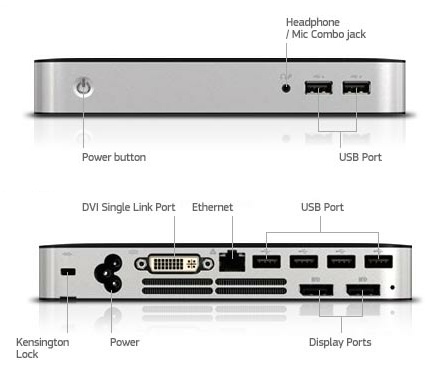 https://plus.google.com/108871877301789098084/posts/BqSP3gJhHo9PURPOSE
https://plus.google.com/108871877301789098084/posts/BqSP3gJhHo9PURPOSENo-hassle computing. Based on Linux, ChromeOS is stripped down to eliminate hassles, and sometimes choice. It updates itself, it repairs and can recover itself. Google doesn't want you to get bogged down on too many options. Hook up a monitor, mouse, and keyboard, sign in to your Google account, choose a desktop background if you want, and away you go. Seriously, that's it.
SPECS1.9GHz Intel Celeron, (or an i5 chip with the I/O version). 4Gb RAM, 16Gb SSD (hard drive), and loads of connection options. If you want, you can pop the bottom cover off and upgrade the RAM to 16Gb and the SSD card all the way to 120Gb! I'm running it with a 24-inch ASUS monitor with ease using either Displayport (to HDMI) or DVI-D. You can run it either by wifi or ethernet; it has a cheap speaker, but works fine with headphones; Bluetooth 3.0; and six USB 2.0 ports, two of which are on front. The Chromebox itself doesn't get hot, and fits just about anywhere.
THE LOOKThe latest version of ChromeOS looks like a simplified (Linux) KDE or Windows screen, with collapsible taskbar. Most everything you do will be in the browser, although you can work separately with Google Drive and some offline items. Google builds multiple versions of the Chrome browser for various OSes, but the version for Chromebox (and Chromebooks) is the same as you find on your desktop PC, using the same extensions, except that I found it renders text better and typing is faster inside of Google Docs. You can change its look with themes if you like.
PERFORMANCEOne word: surprising! It's no PC, but remember, you're OS is not having to juggle a lot of processes, thus resources are devoted almost entirely to browser and video performance. From composing documents to video to music to having 32 tabs open in multiple windows, it doesn't slow down. It boots in 5-6 seconds, awakes instantly on Ethernet, and shuts down instantly. You can insert any USB drive to add, download, or access photos with the superfast image viewer included.
POSITIVESFor a Chromebox (or Chromebook) to be a positive experience, you have to accept a slightly different type of computing. It's not a PC, i.e., a production machine. It's more like an powerful appliance, but one that needs little electricity to use, even if you leave it on 24 hours a day. I thought the 16Gb SSD would be too small, but I've yet to really use it and don't see that I will. The whole experience is fast, and I like that. And if you have someone in your family -- old person, or someone new to the web, or even a kid -- a Chromebox is unbreakable and needs no tech support! With each ChromeOS update comes the treats of more speed and more features. My own PC habits have evolved from Windows to Linux to a variety of devices -- tablet, Chromebox, PC, phone. I don't have just one set of needs at this time in my life. And since my browser settings and bookmarks are synced among devices, there's no setup among them. If you forced me to choose one device, I'd think very hard before turning this down.
NEGATIVESMany of the negative personal reviews I've seen of Chromebox and Chromebook are demanding that it be something it isn't: a full desktop PC. I discount those, because that's not the purpose here. This is an internet machine; some call it an appliance, but it's not a PC. If you need a PC, buy a PC. But here are three:
(1) The Chromebook/box version of the Chrome browser has more security restrictions, preventing one from assigning a local home page. I've always used my own "start page" of links for years. I hate this, and though I can work around this by opening the document from Gmail and bookmarking it, it's not the same. Greater browser security, however, is not often a negative.
(2) File handling is different. You're not really working with a traditional HD, so files are mostly handled online by linking and copying. You can download them to Google Drive or even your SSD or a USB stick. But after a week, you won't want to because your habits will have changed. Thus, this only a temporary negative.
(3) The $330 sticker price. Although I agree with this criticism, it would be tough to build a mini for much less and have it work this well. The next generation should be interesting.
IS IT WORTH IT?Hell yea! I not only would buy this again, I would recommend it to just about anyone who spends their PC time browsing, reading, viewing media, and social networking. It's just fun, and that's something often missing from computing.